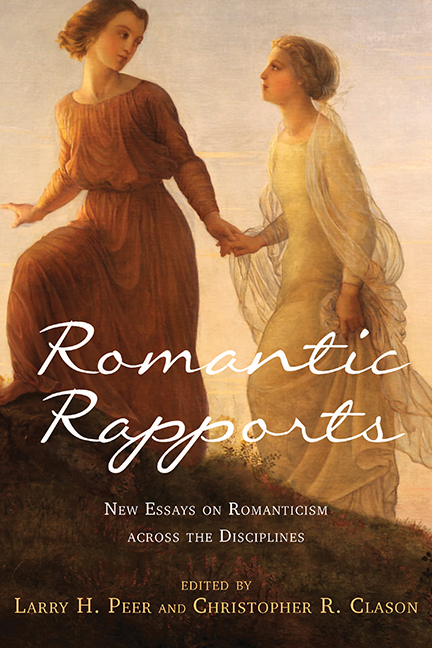Book contents
- Frontmatter
- Dedication
- Contents
- Acknowledgments
- Introduction: The Polyvalence of Romanticism
- Part I Romanticism and the Literatures
- 1 Werther and Harold: Rapport and Difference in the Literary Articulation of the Romantic Subject
- 2 Balzac and the French New Wave: A Problematic but Enticing Relationship
- 3 Romantic Relations and Constructive Affinities: Notions of Family in Kater Murr
- 4 Françoise's Way and Bloch's Way: Two Paths of French Romanticism in Proust's À la recherche
- Part II Romanticism, Music, and the Visual Arts
- Part III Romanticism and Science, Technology, Philosophy
- Notes on the Contributors
- Index
1 - Werther and Harold: Rapport and Difference in the Literary Articulation of the Romantic Subject
from Part I - Romanticism and the Literatures
Published online by Cambridge University Press: 30 August 2017
- Frontmatter
- Dedication
- Contents
- Acknowledgments
- Introduction: The Polyvalence of Romanticism
- Part I Romanticism and the Literatures
- 1 Werther and Harold: Rapport and Difference in the Literary Articulation of the Romantic Subject
- 2 Balzac and the French New Wave: A Problematic but Enticing Relationship
- 3 Romantic Relations and Constructive Affinities: Notions of Family in Kater Murr
- 4 Françoise's Way and Bloch's Way: Two Paths of French Romanticism in Proust's À la recherche
- Part II Romanticism, Music, and the Visual Arts
- Part III Romanticism and Science, Technology, Philosophy
- Notes on the Contributors
- Index
Summary
ROMANTICISM, AS WE HAVE increasingly come to understand it, is a transnational and multilingual phenomenon. Striking affinities, even across divergent nationalities and languages, bind the long period of Romanticism into a recognizable and coherent body of cultural engagement, responses, and achievements. The exploration of subjectivity is one such concern that transcends those traditional boundaries. For instance, Rousseau's Julie, ou, la nouvelle Hèloïse (1761; Julie, or the New Heloise), Goethe's Die Leiden des jungen Werthers (1774; The Sorrows of Young Werther), and Byron's Childe Harold's Pilgrimage (1812–18) present three exemplary figures—St. Preux, Werther, and Harold—whose similar struggles with questions of selfhood are foundational for understanding Romanticism and its development across those three generations, three countries, and three languages. How does the self emerge out of a common and conventional literary past? How does it find its place against the background of nature, especially the sublime landscape of the Alps? It initially appears, with Rousseau's St. Preux, that the formation of an authentic subjectivity is dependent on an individual and unique sensibilité responsive to a world of nature free from tradition. Nevertheless, what the novel ultimately reveals is not only that Julie and St. Preux's love has a decidedly conventional character but that it also occurs against the background of a humanized landscape. Similar contradictions disturb Goethe's Werther and Byron's Harold, though with important differences.
Bryon's work especially exemplifies a trend in Romanticism that turns away from the antihistorical nature of Platonic philosophy as the method for grounding truth and, instead, seeks to rearticulate the subject and his world in the textual contingencies of history and tradition. To demonstrate that movement it will be helpful to frame it with what Ernesto Laclau calls the Platonic theory of articulation (Politics, 33ff.) and then recontextualize canto 3 of Childe Harold's Pilgrimage within the more immediate literary tradition and problematics encountered in The Sorrows of Young Werther. Byron's own self-image derives from his reading, and the Weltschmerz of his fictional self, Childe Harold, finds its origin, in part, in the “melancholic soulsearching” of Werther (Vassallo, 22).
- Type
- Chapter
- Information
- Romantic RapportsNew Essays on Romanticism across the Disciplines, pp. 13 - 33Publisher: Boydell & BrewerPrint publication year: 2017



